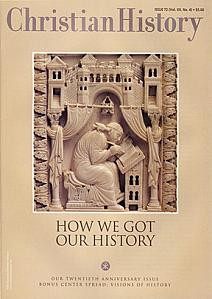Eusebius Compiled Three Hundred Years of Lost Church History

We remember him as the "Father of Church History."
EUSEBIUS is called the “Father of Church History,” and deservedly so. Although what he compiled was not history in the modern sense, it was, in its own day, breathtakingly new. It remains a treasure trove for modern researchers.
Born around 270, Eusebius became a Christian and a priest in Caesaria. There he had access to the extensive library Bishop Pamphilius had assembled. Working with scraps of information from dozens of sources, Eusebius created a chronology of hundreds of historical events. This served as an anchor for his other works. With Pamphilius, he co-authored a defense of Origen. Altogether, Eusebius wrote at least forty-six books, several of them ten to twenty volumes long or more. Many, including his defense of Origen, have unfortunately been lost.
One volume that survived is his history of the early church. He began with Jesus and his followers. “Could I do better than start from the beginning of the dispensation of our Savior and Lord, Jesus Christ of God?” he asked. Although he gave a list of the Roman bishops, his main emphasis was on the churches of today’s Middle East. Western countries, Arabic regions, and the Persian Empire rarely appear in his work.
Irrepressibly ready to defend Christianity, Eusebius was keen to establish its bona fides and to show the origins of competing errors. Thus, he gives in his history lists of bishops for major cities (in order to show an unbroken line of orthodoxy back to the apostles), discussions of which books belong in the Bible, refutations of heresies, descriptions of terrible persecutions, and accounts of glorious martyrdoms.
Eusebius stood with the martyrs of his own land. Both Pamphilius and Eusebius went to prison. Pamphilius died a martyr, but Eusebius won release. He became bishop in Pamphilius’s stead, taking the name Eusebius Pamphilius in honor of his friend. His release from prison—and his subsequent close relations with Constantine—have led scholars to speculate that he came from a prominent family.
Eusebius had a tremendous ability to remember details from many sources and to stitch together scraps of information gained from books, letters, and documents. Thanks to this, he preserved much of what we know about the early church.
Before and during the first Council of Nicaea, Eusebius seemed to side with the Arians. Even when he accepted the creed formulated by the council, he wrote a letter indicating he had reservations about its wording. But his history and other writings show he truly loved Christ, the church, and the word of God.
When Eusebius died on this day, 30 May 339, he was in his mid-seventies. What he left us is so valuable that we can only hope archaeologists will turn up some of his missing manuscripts.
—Dan Graves
----- ------ ------
Christian History #72, How we got our history, has an article on Eusebius, "The Problem of Eusebius"






